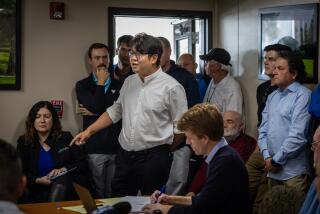Gary Player Sides With PGA Protesters : Golf: Once a victim of protests, South African says he supports people who plan to demonstrate.
- Share via
In 1969, anti-apartheid demonstrators at the PGA Championship threw a drink in Gary Player’s face. Now, Player is siding with protesters.
The South African golfer said Sunday that he supports people who plan to demonstrate at the PGA Championship in Birmingham, Ala., to protest the host club’s all-white status.
“If I was in those peoples’ shoes I would also demonstrate,” said Player. “That’s the advantage of a free society; people are entitled to demonstrate.”
Player won’t play in the PGA, but he made that decision before the controversy started.
The membership policy at Shoal Creek Country Club came under scrutiny last month when the club’s founder, Hall Thompson, was quoted in an Alabama newspaper as saying that his club would not be pressured into accepting blacks.
Thompson later apologized for the remark, but the controversy has continued. Major sponsors have pulled their TV ads for the tournament, civil rights groups are planning protests and former PGA champion Lee Trevino says he may not play the Aug. 9-12 tournament because of the controversy.
“The fact that Toyota, which is my sponsor, and IBM have announced they’ve decided to drop their commercials from the telecasts has me thinking,” Trevino said. “Hey, I’m a member of the PGA and I hate to see my organization shoot itself in the foot like this.”
Player, who won the Seniors British Open on Sunday, said: “I was bitterly disappointed at Mr. Hall Thompson’s statements. I just think that they were uncalled for. In this world today we don’t have a choice; we’ve just got to look at each other and talk to each other.”
Throughout his career, Player has been the target of protesters who wanted him to be more vocal about his opposition to apartheid in South Africa. Now, he and other golfers are being asked to comment on the Birmingham situation.
Calvin Peete, one of black players on the PGA Tour: “I felt those statements (by Thompson) were directed not just at people in Birmingham, but all blacks in general. When you say something like, ‘The club is like our home and we invite whomever we want to our home. We have Japanese and Chinese, but we don’t have any blacks and we don’t want any blacks.’ . . . That’s letting me know that they don’t want me there.”
But some white players are sidestepping the issue.
Said Payne Stewart: “I play golf for a living. It’s a club policy that I didn’t have anything to do with, so I don’t feel it affects me.”
Fuzzy Zoeller: “I think our job is to go down there and play golf. I don’t have anything to do with politics.”
Roger Maltbie: “I wouldn’t consider withdrawing for a minute. I haven’t heard anyone say they wouldn’t play.”
The NAACP has put its protest plans on hold for the PGA, but the Southern Christian Leadership Conference is still angry about the tournament being held at an all-white country club.
The Rev. Abraham Woods, president of the Birmingham SCLC, said Saturday the organization still plans to have pickets at the city’s airport when golfers and PGA officials arrive for the tournament.
However, Woods said those plans could change.
He told NBC-TV’s Gayle Gardner that the protests would be called off if two blacks were given Shoal Creek memberships.
“Already there are two blacks, two professional men, men who like to golf, men who are able to pay the $35,000 fee who would like to join. I think it’s a wonderful opportunity for the people of Shoal Creek to consider these men.
Gardner: “So you’re saying that if these two men are brought into the club within the next two weeks before the tournament starts that you will call off your protests.”
Woods: “Absolutely.”
Gardner also interviewed attorney Frank Young, who heads Operation New Birmingham, an organization aimed at building better race relations in the city. Young said even an expedited membership application would probably take at least six months.
“And then again,” Young said, “I think there’s some aspect to not necessarily having a board of governors act with a time limit or maybe even with a gun to your head to have to make a membership decision over a very short time of constraint.”
Said Woods: “I just can’t understand that, because we can get a new member of the Supreme Court in less time than that and I need not tell you that a member of the Supreme Court of these United States is much more important than being a member of Shoal Creek.”
More to Read
Go beyond the scoreboard
Get the latest on L.A.'s teams in the daily Sports Report newsletter.
You may occasionally receive promotional content from the Los Angeles Times.










